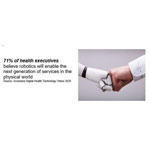Healthcare Organizations Must Transform Digital Experiences Between People and Technology to Lead the Future of Care, Finds Research From Accenture

NEW YORK–(BUSINESS WIRE)–Healthcare organizations need to become more collaborative in creating new digital healthcare experiences to help customers feel engaged, important and informed, according to research from Accenture (NYSE: ACN).
Based on a survey of 259 payer and provider healthcare executives, the report — Accenture Digital Health Technology Vision 2020 — notes that the vast majority (85%) of executives believe that technology has become an inextricable part of the human experience. Furthermore, 45% of those polled said that rapid advancements in new technologies and scientific innovations are positioned to disrupt their industry.
“The intersection between digital technology and healthcare experiences has certainly accelerated with the COVID-19 pandemic, and leading the future of care will demand rethinking core assumptions about the intersection of people and technology,” said Dr. Kaveh Safavi, a senior managing director in Accenture’s Health practice. “People’s perceptions of and relationships with technology are changing, and to adapt, healthcare payers and providers need to redesign digital experiences.”
The research found that 69% of healthcare payers and providers are already piloting or adopting artificial intelligence, which will enable fluid interactions between human and machines. Yet only 39% said they have inclusive design or human-centric design principles in place to support human-machine collaboration.
In addition, more than two-thirds (71%) of the executives believe that robotics will enable the next generation of services in the physical world, yet 54% believe that their employees will be challenged to figure out how to work with robots.
“The use of robotics is especially exciting in healthcare, where need has no boundaries and workers are already spread thin,” Dr. Safavi said. “But as robotic capabilities extend beyond controlled environments, healthcare organizations will face new challenges around talent investments, data collection, and human-machine interaction and collaboration.”
The report argues that despite benefiting broadly from technology, people are expressing concerns about how and for what it’s used. A majority (70%) of healthcare consumers polled as part of the research said they are concerned about data privacy and commercial tracking associated with their online activities, behaviors, location and interests. The same number (70%) of consumers also said they expect their relationship with technology to be more prominent in their lives over the next three years.
With more than three-quarters (78%) of the healthcare provider and payer executives saying they believe that the stakes for innovation have never been higher, the report notes that “getting it right” will require new ways of innovating with ecosystem partners and third-party organizations.
“COVID-19 has not slowed digital technology innovation; rather, it’s amplifying it to historic levels,” said Dr. Safavi. “Given the current environment, healthcare organizations must elevate their technology agenda to explore emerging digital technologies that provide the right infrastructure to help people feel safer about using technology tools for their healthcare experience.”
The full report can be accessed here.
Methodology
The Accenture Digital Health Technology Vision 2020 report is derived from Accenture’s most-recent annual Tech Vision 2020 report, which predicts key trends likely to disrupt business over the next three years. Accenture gathered input from the Technology Vision External Advisory Board, conducted interviews with technology luminaries and industry experts from the public and private sectors, academia, venture capital and entrepreneurial companies. Accenture Research conducted a global online survey of 6,074 business and IT executives from 25 countries, including 85 health payer and 174 health provider executives in the U.S., U.K. and Australia. The survey was fielded between November 2019 and January 2020. In parallel, Accenture Research surveyed 2,000 people in the U.S., U.K., China and India, with respondents representing different age and demographic groups, to understand the use and role of technology in people’s lives.
About Accenture
Accenture is a leading global professional services company, providing a broad range of services in strategy and consulting, interactive, technology and operations, with digital capabilities across all of these services. We combine unmatched experience and specialized capabilities across more than 40 industries — powered by the world’s largest network of Advanced Technology and Intelligent Operations centers. With 513,000 people serving clients in more than 120 countries, Accenture brings continuous innovation to help clients improve their performance and create lasting value across their enterprises. Visit us at www.accenture.com.
Disclaimer: This document is intended for general informational purposes only and does not take into account the reader’s specific circumstances, and may not reflect the most current developments. Accenture disclaims, to the fullest extent permitted by applicable law, any and all liability for the accuracy and completeness of the information in this presentation and for any acts or omissions made based on such information. Accenture does not provide legal, regulatory, audit, or tax advice. Readers are responsible for obtaining such advice from their own legal counsel or other licensed professionals.
Contacts
Cam Granstra
Accenture
+1 312 693 5992
cameria.l.granstra@accenture.com

